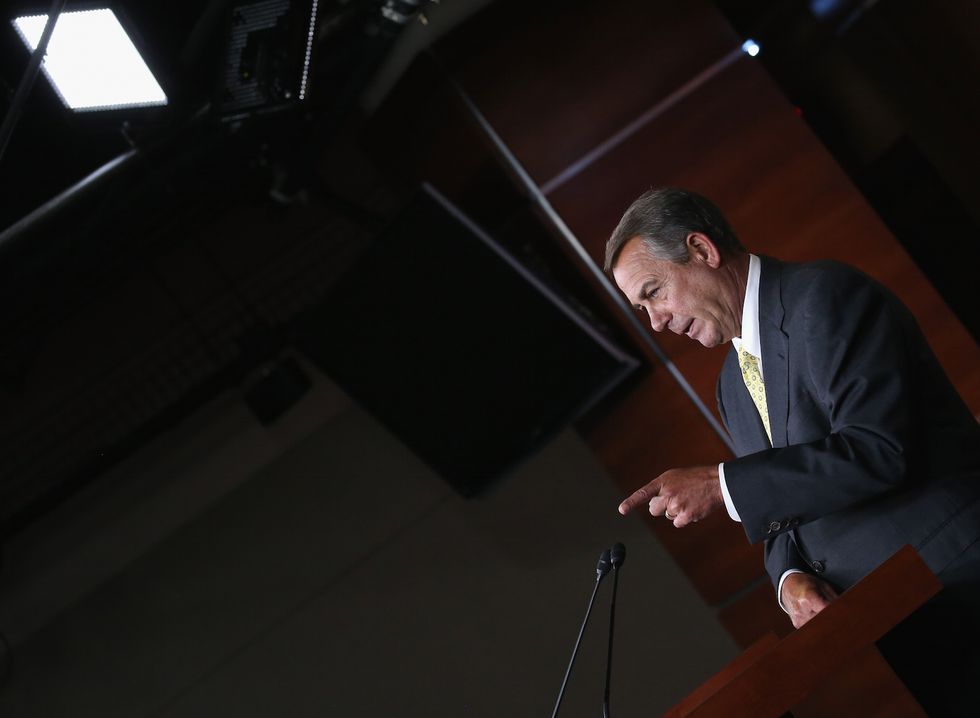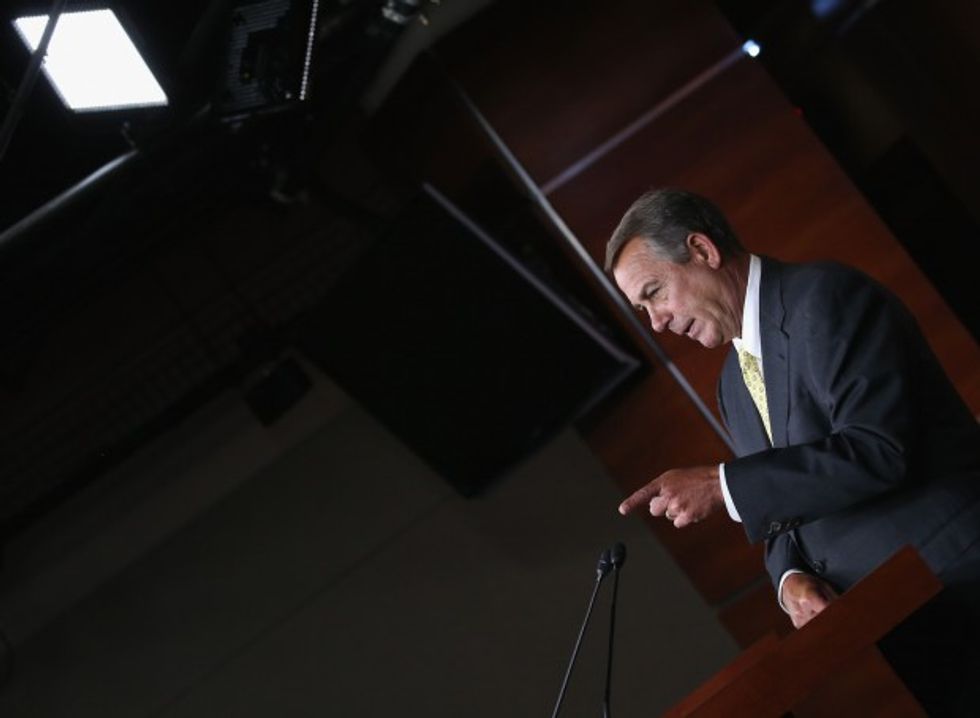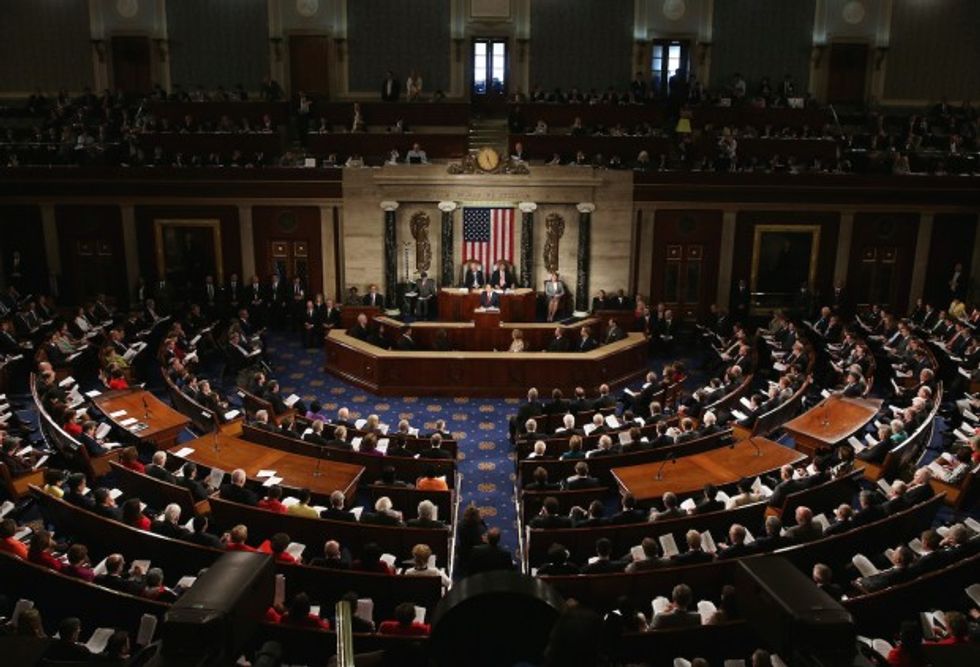
House Speaker Boehner John Boehner (R-Ohio) speaks to the media during a news conference at the U.S. Capitol April 30, 2015 in Washington, D.C. (Photo by Mark Wilson/Getty Images)

Story by the Associated Press; curated by Oliver Darcy.
—
WASHINGTON (AP) — The House Thursday adopted a compromise GOP budget that promises to speed repeal of the President Barack Obama's health care law while giving the Pentagon an additional $38 billion.

The 226-197 vote sends the non-binding budget plan to the Senate for a vote next week. It promises to balance the budget in nine years with more than $5 trillion in spending cuts, though Republicans make clear they aren't interested in actually imposing controversial cuts to programs like Medicare, food stamps, Pell Grants or the traditional Medicaid program with follow-up legislation.
Instead, the House-Senate budget framework increases spending in the near term by padding war accounts by almost $40 billion next year. And Senate Republicans skittish over politically dangerous cuts to Medicare blocked a House move that called for giving subsidies to future retirees to purchase health insurance on the open market instead of a guaranteed package of Medicare coverage.
Under Washington's arcane budget process, lawmakers first adopt a budget that's essentially a visionary document and follow it up with binding legislation to set agency budgets, cut or raise taxes, and make changes to so-called mandatory programs like Medicare and food stamps, whose budgets run as if on autopilot.
Republicans tout the long-term economic benefits of a balanced budget and say it's better to tackle the long-term financial problems of programs like Medicare and Medicaid sooner rather than later.
Budget Committee Chairman Tom Price, R-Ga., said the GOP plan "will not only get Washington's fiscal house in order but pave the way for stronger economic growth, more jobs and more opportunity. It invests in our nation's priorities, ensures a strong national defense and saves and strengthens and protects important programs like Medicare and Social Security."
But Democrats say the GOP plan unfairly targets the middle class and the poor while leaving in place lucrative tax breaks for corporations and the wealthy.
"The Republican budget moves this country in exactly the wrong direction," said Sen. Bernie Sanders, I-Vt., who Thursday announced a run for the Democratic presidential nomination. "At a time of massive wealth and income inequality, it gives huge tax breaks to millionaires and billionaires, while making devastating cuts to education, Medicare, affordable housing and prescription drug coverage."
This year, Republicans are focused mostly on finally delivering legislation to President Barack Obama that would repeal the bulk of his signature health care law. Successful action on Thursday's budget plan would permit a health care repeal to advance through the Senate without threat of a Democratic filibuster. Obama is sure to veto the measure, which is scheduled to advance by late July.

While assuming expiration of health insurance subsidies and repeal of the expansion of Medicaid coverage under the health care law, the measure relies on about $2 trillion worth of cuts to health care providers and tax hikes enacted under the 2010 law to promise balance over the coming decade.
"The Affordable Care Act is still here, the revenue is still here, and the Republican budget assumes that revenue for the purpose of achieving balance," said Rep. Chris Van Hollen, D-Md. "That leaves people's heads spinning and it means the budget is not in balance."
Separately, the House moved ahead on spending bills for the departments of Veterans Affairs and Energy. Both measures face veto threats because they fall short of Obama's budget request, even as Republicans are skirting next year's budget limits on the Pentagon by $38 billion by padding off-budget war accounts.
Obama insists he'll block Republicans from boosting the Defense Department's budget unless they agree to relief for domestic programs as well. The Pentagon and domestic agencies alike are being hit by automatic spending cuts known as sequestration, which are the result of Washington's collective failure to come up with enough deficit savings to replace them.
The GOP budget also promises cuts to domestic agency operating budgets that are passed by Congress each year that are deeper than the already-unrealistic levels required under sequestration. Such budgets would be cut by about $500 billion over 10 years.
Two of the Senate's Republican presidential hopefuls, Ted Cruz of Texas and Rand Paul of Kentucky, voted against the Senate's budget last month as too timid, while Florida's Republican Sen. Marco Rubio endorsed it.
—